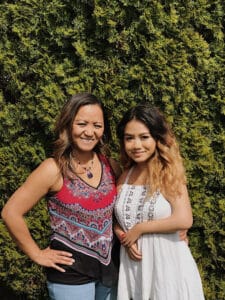As someone born with a physical disability, I’ve come to learn the importance of being my own advocate. In its simplest terms, self-advocacy means speaking up for yourself. It means understanding your needs, while at the same time being able to help other people to understand them too.
It can be really hard to gain the ability to advocate for oneself. As parents, you can help your child develop the skills they need to get their needs met and achieve their goals.
We live in a world that does not always cater to disabled individuals. As much as parents would like to protect their children, it is important to understand that self-advocating is key to creating the life their children deserve.
I was born with a rare disorder called Arthrogryposis Multiplex Congenita (AMC). Arthrogryposis is characterized by multiple joint contractures (stiffness) and muscle weakness throughout the body. The most common type of arthrogryposis affects hands, wrists, elbows, shoulders, hips, feet and knees. In more severe types, every joint can be affected, including the jaw and spine. I am affected in all 4 limbs, but my hands and arms are affected the most. I can’t raise my arms, grip things, and have very little muscle and joint movement, so you can imagine that this makes the day to day a bit challenging. Having such a unique perspective of the world has only helped me want to make the most of it, and share my experiences to help others.
Here’s what my mom taught me about how to self-advocate
When I was born, doctors told my mom that I would never be able to walk. Although devastated by this news, something in her gut was telling her that I still had to try. She isn’t the type of person to take no for an answer, so from the time I was old enough to stand, she practiced with me every day and night. After years of constant frustration, pain and tears, I finally took my first steps at the age of 5. I haven’t stopped walking since.
Without my mom’s inherent stubbornness, my life would look a lot different today. From the moment I entered this world she has been my biggest advocate, and over time she provided me with the tools to become my own. Seeing her strength and determination made me strong myself.
You can teach self-advocacy in your day-to-day parenting
It’s important to teach your children to become their own advocates starting from a young age. The first step is letting your child know that they are worthy and deserving of respect, and just because they are different doesn’t mean they deserve to be treated differently.
A helpful way for children to become more confident is by letting them have some control in different aspects of their lives and daily routine. Growing up, my mom often gave me the freedom to pick out my own clothes everyday. Since I had very little control over my body and other aspects of my day-to-day life, it was very important to me to be in charge of the little things. She also always let me go for any club or sport my little heart desired. Even if I couldn’t play like the other kids, or had the potential to be disappointed, she never held me back from anything I wanted to do.
This sounds simple, but you are giving your child the chance to practice speaking up for themselves and advocating for the things they want in life. And if your child isn’t fully able to voice their opinions and concerns verbally, listen to their body language. There is more than one way to communicate with each other.
As parents of children with disabilities, you will go to the ends of the earth to create a wonderful and accessible life for them. You will be their advocate until they are old enough to know what they do and don’t need. And in some cases, you will be their advocate for most of their lives. Either way, it’s important to learn your child’s needs.
Although I’m not a parent yet, I do know what it’s like to be a child with a disability. My life has been nowhere near easy, and I’ve faced a lot of adversity. I was scared of the world. I was mad at the world. and I often asked “Why me?” “What did I do to deserve this?” “Will it ever get better?”
I needed to know my mom was behind me every step.
Your child needs community. You can help them find it.
Having a disability can be isolating. When you don’t have a community around you that can relate to your unique circumstances, you feel like there isn’t a place for you to fit in. I encourage anyone with a disability to seek out other individuals that maybe share the same condition, or just reach out to other disabled individuals in general. Parents: make sure your child is connected with people who they can relate to.
The power of community is so important. I wish then I had access to the community I do now, so I may not have felt as alone as I did. The hardest years of my life were when I was in school. I always knew that I was different from the other kids. Feeling like an outsider caused me to revert into myself and made me extremely shy around others.
I was often afraid to ask anyone other than my mom for help in fear of being a “burden”. But my mom wanted to make sure I could ask others for help. Sometimes if I asked her for help she would say, “I’m sorry but I can’t, but you can ask (insert name)”. Even practicing this with other family members can be helpful. My mom wanted me to know that if I wanted to be an independent adult one day, I couldn’t depend on her forever.
If I could go back in time, I would tell myself that the sooner you are able to speak up for yourself and look to others for help, the easier your life will become.
Another way to teach self-advocacy is role-playing. This is a good way to prepare them on how to handle different situations that may arise while becoming more independent. Have them practice what they would do in real-life situations such as interviewing for a job, going to the doctor, or going to the store. For younger kiddos, you can practice different situations that could arise in school, at their friend’s houses, or even at the park with their friends. Make sure you emphasize the importance of asking questions when there is something they don’t understand. When your child can question why something is happening, they are learning to look out for themselves.
Advocating for myself in school
At the beginning of every school year, I had my IEP meeting with the administration to talk about plans and the accommodations I would need for that year. My mom always made sure that I spoke for myself, because I know better than anyone what those needs are. I started participating in these meetings starting in middle school, and would voice my opinions and concerns on what I felt worked for me during the previous school year. Most of the time I would keep things the same, but there would be other times that I felt that I needed an alternative option or get rid of certain things all together.
What’s important was that I felt like I was being heard. Sometimes if you speak too much for your child, they become comfortable with your making the big decisions and they lose sight of their own needs. And although at the time it was a daunting and intimidating experience being the kid talking to the adults, I was able to ensure I had everything I needed for a successful year. I learned to advocate for myself throughout my entire schooling, all the way up to college.
Becoming my own advocate in college
Going off to college was the first time I was ever away from home in all my 18 years of life, and away from all the adults I grew accustomed to helping me on a daily basis. It was definitely an emotional and scary thought for both my mom and me. No one would help me with my everyday routines in the dorms or with getting around the school. It was all going to be up to me now. Although it was slightly terrifying, I was so excited to finally be my own person and discover the endless possibilities the world had to offer.
My mom and I had been preparing for this next step since I started high school. She enrolled me in a “boot camp” during the summer of my freshman year at Nemours Children’s Hospital, one of the very few hospitals in the country that specializes in AMC. Because of this, they offer a lot of adaptive technology/equipment and techniques that are specifically catered to my needs.
Before this program, I always needed help getting dressed everyday. The occupational therapists there were able to come up with a way for me to get dressed/undressed by attaching hooks onto the wall. They came up with a way for me to get my shoes on and off and gave me tips and ideas for showering and preparing for school. This opportunity really prepared me for college and gave me so much independence while also taking a lot of the pressure of my daily needs off my mom’s shoulders. I recommend occupational therapy to anyone with a disability.
Being able to self-advocate for myself through my schooling allowed me to gain the confidence I needed to advocate for myself into my adulthood.
My college years taught me so much about myself, and I am so proud of myself for doing it all on my own. I ended up graduating with a degree in Art Therapy with a minor in Psychology. I am working towards becoming a certified Art Therapist in hopes of inspiring other kids with disabilities the chance to express themselves through the arts, and provide them with the skills and tools to do so. I had different jobs while still in school, starting when I was 15. Advocating for yourself in the workplace is a little harder than advocating for yourself in school. There is always that fear that you will be seen as a burden, but it is important to teach your children their rights in the workplace. The right job will always be accommodating of their needs, so they should never be afraid to voice them.
The journey to self-advocacy begins with self-love. Above all else, make sure your children learn to love themselves. Confident parents create confident children. Kids are more intuitive than we give them credit for, so if they see their parents speaking up and advocating for them, they will learn what it takes to do so for themselves. If I didn’t have my mother to model what a strong and independent adult looks like, I would have never become one myself.
Any individual with a disability is deserving and capable of living a full and happy life. This world was not built for us, so it is up to parents to teach, and for children to learn the important life skills and tools to build it ourselves. Teach your children their rights. Encourage them to be loud and to not be afraid to take up space. And above all else, let them know it is okay to ask for help.
More resources for how to teach a child to self-advocate:
How to teach self-advocacy to your student with disabilities
Self-advocacy for young adults: Overcoming fears
Planning the transition to adulthood: Life with disabilities after high school
Is your teen going to college with a disability? Here’s how to help them get ready.




